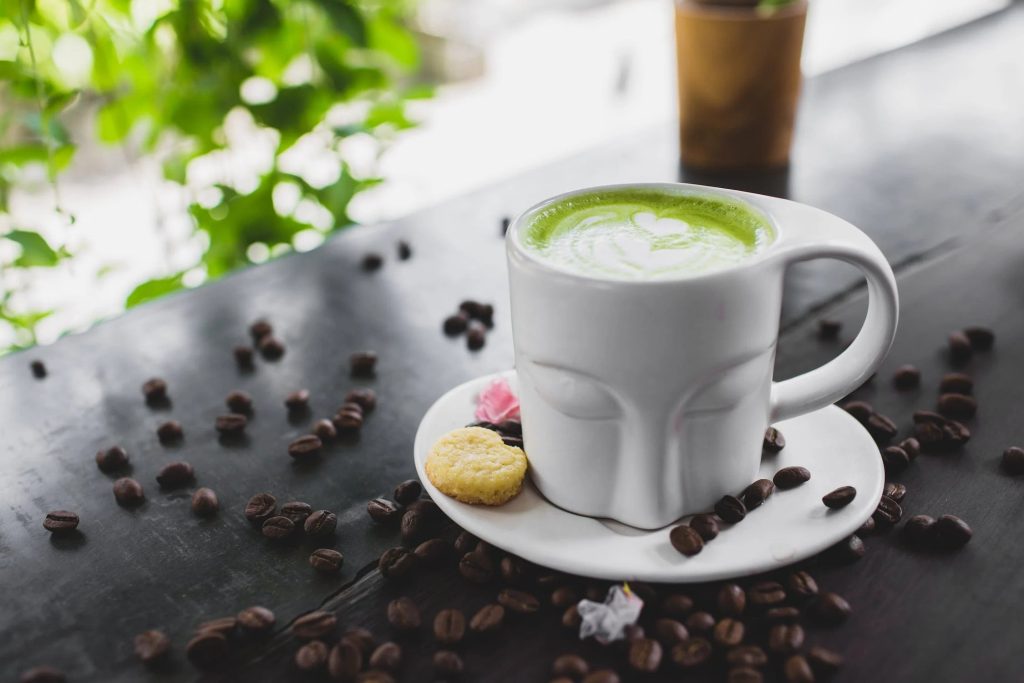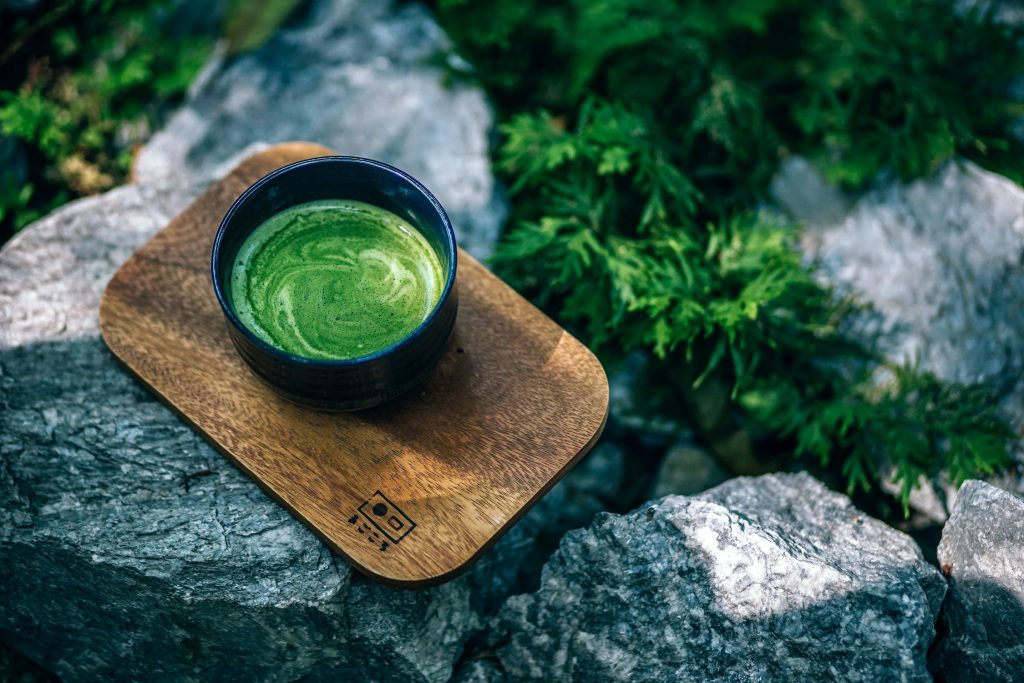You’re pregnant and suddenly every bite matters. Can You Drink Matcha While Pregnant? Green tea, full of antioxidants but also caffeine, leaves you puzzled. You’re wondering, ‘Is matcha safe during pregnancy?’
Let’s navigate this together, uncovering the truth about matcha’s effects on you and your baby. We’ll explore its benefits and risks so you can make an informed decision.
Your pregnancy journey is unique. Let’s ensure it’s healthy, too.
Understanding Matcha: An Overview
While you might know matcha as a popular ingredient in lattes and sweets, it’s essential to understand that it’s a unique form of green tea with its own characteristics and health benefits.
Unlike regular green tea, matcha is a powdered form derived from whole tea leaves. This gives it a richer, creamier texture and a more potent concentration of nutrients. It’s packed with antioxidants that can reduce inflammation and contain L-theanine, an amino acid that promotes relaxation and alertness.
However, due to its concentrated nature, matcha also has a higher caffeine content, ranging from 30 to 80 milligrams per serving. It’s crucial to remember this if you’re pregnant, especially if you’re monitoring your caffeine intake.
Is matcha safe to drink during pregnancy?
You might wonder if enjoying your favorite matcha drink while pregnant is safe. The good news is, yes, matcha is generally safe during pregnancy. However, it’s essential to consider its caffeine content.
Matcha contains between 30 and 80 milligrams of caffeine per serving, so you must monitor your daily intake. Health agencies suggest staying below 200-300 mg of caffeine daily during pregnancy.
There are also concerns that green tea might affect the absorption of folic acid, which is crucial for your baby’s development. So, while you can enjoy the antioxidant benefits of matcha, it’s best to limit your consumption to one or two cups a day and always consult your doctor before making any dietary changes.
Caffeine Content in Matcha
Given matcha’s concentrated nature, you should know it contains more caffeine than traditional green tea. A cup of regular green tea has roughly 30 mg of caffeine, but matcha can contain between 30 and 70 milligrams per serving. If you’re pregnant, this is something to consider.
Health agencies recommend limiting caffeine intake to less than 200-300 mg daily during pregnancy. So, while matcha isn’t off-limits, it’s important to moderate your consumption. Remember that these could also affect your health if you’re drinking matcha in lattes with added sugars and syrups.
Ultimately, while matcha’s antioxidants and L-theanine can be beneficial, it’s best to consult your doctor before making any diet changes during pregnancy.
Benefits of Matcha During Pregnancy
You might be wondering about the benefits of drinking matcha during pregnancy.
Well, matcha, packed with antioxidants, can boost your immune system.
Plus, it has a calming effect that could be beneficial during this particular time in your life.
Antioxidants
Packed with antioxidants, matcha offers you certain health benefits even during pregnancy. The primary antioxidants in matcha are catechins, widely recognized for their fight against cell damage, potentially reducing your risk of chronic diseases. This can be beneficial in maintaining your overall health while expecting.
Moreover, these antioxidants can also help boost your immunity, which is crucial during pregnancy.
Additionally, matcha’s rich source of antioxidants can aid in reducing inflammation and promoting skin health. It also contains L-theanine, an amino acid associated with relaxation and alertness without the jitters of caffeine. However, remember to moderate your matcha intake due to its caffeine content.
Always consult your doctor before incorporating new food or drink into your pregnancy diet.
Boosts Immune System
Building on the previous discussion, it’s worth noting that matcha also significantly boosts your immune system during pregnancy besides being rich in antioxidants. This powdered green tea is packed with epigallocatechin gallate (EGCG), a potent catechin that aids in maintaining a healthy immune system. Not only does it help fend off common illnesses, but matcha can counteract the immune suppression that often occurs during pregnancy.
Furthermore, matcha’s antibacterial properties can promote oral health, reducing the risk of gum disease and cavities. However, you should consult your healthcare provider before incorporating matcha, as you would before making any other dietary changes. While matcha has numerous benefits, remember that moderation is key to reaping its advantages without a caffeine overload.
Calming Effect
In addition to boosting your immune system, another significant benefit of matcha during pregnancy is its calming effect. This comes from a unique amino acid, L-theanine, found in matcha. L-theanine promotes relaxation and alertness without causing drowsiness or jitteriness. It’s a gentle way to stay focused and calm, which can be particularly beneficial during pregnancy when your body and emotions might seem on a rollercoaster ride.
Moreover, preparing and drinking matcha can be a soothing routine, providing peace on a busy day. But remember, moderation is key due to matcha’s caffeine content. As always, it’s best to consult your healthcare provider before making dietary changes during pregnancy.
Guidelines for Matcha Preparation
Now, let’s talk about how to prepare matcha if you’re considering it during pregnancy.
Knowing the right way to brew it, choosing quality matcha, and the recommended serving size can make a difference.
These factors will help you manage your caffeine intake while enjoying its benefits.
Proper Matcha Brewing Technique
You’ll want to know how to brew matcha, as the preparation can impact its taste and caffeine content. Here’s a simple guide to get you started:
- First, boil water, but let it cool slightly before adding to your matcha. The ideal temperature is around 175°F.
- Too hot water can make your matcha taste bitter.
- Next, sift 1-2 tsp of matcha into a bowl to remove clumps.
- Clumps can ruin the smooth texture of your drink.
- Then, add a small amount of water and whisk briskly in a ‘W’ or ‘M’ shape until frothy.
- This method ensures that the matcha is evenly dispersed.
- Finally, add the remaining water and whisk again until well combined.
Enjoy your matcha in moderation during pregnancy, and don’t forget to consult your doctor about your caffeine intake.
Choosing Quality Matcha
To ensure you’re reaping the full benefits of matcha during your pregnancy, it’s crucial to select a high-quality product and prepare it correctly.
Always opt for organic matcha, free of synthetic fertilizers and pesticides. The best quality matcha has a vibrant green color and a fresh, grassy aroma.
When preparing, use a bamboo whisk to fully incorporate the powder into hot water, creating a smooth, frothy texture. Remember, matcha can be potent, so stick with the recommended serving of half a teaspoon per cup.
You should also avoid matcha products with added sugars or flavors.
Matcha Serving Recommendations
Understanding the correct way to prepare and serve matcha is crucial when pregnant, as it can influence the caffeine content and potential health benefits you receive from the drink.
Here are some guidelines for preparing and serving matcha:
- Use 1-2 teaspoons of matcha powder per 8 ounces of water.
- Heat the water to just below boiling, around 175 degrees Fahrenheit.
These guidelines can help ensure you’re not consuming too much caffeine at once:
- Limit your intake to one or two servings of matcha per day.
- If you’re sensitive to caffeine, consider half servings.
Risks of Drinking Matcha While Pregnant
During pregnancy, it’s important to know that drinking matcha can pose risks due to its caffeine content and potential impact on nutrient absorption. Matcha is a concentrated form of green tea containing more caffeine. This could exceed recommended daily limits, leading to complications like low birth weight or preterm birth.
Matcha might also affect how your body absorbs crucial nutrients like iron and folic acid. Deficiencies in these nutrients can lead to issues like anemia and neural tube defects in your baby.
Moreover, if you’re having matcha lattes loaded with cream and sugar, you’re adding extra calories and possibly endangering your blood sugar levels, especially if you have gestational diabetes.
Always consult with your healthcare provider before making dietary changes.
Frequently Asked Questions
Can the Taste or Aroma of Matcha Trigger Morning Sickness During Pregnancy?
Yes, the taste or aroma of matcha could trigger morning sickness. It’s highly individual, though. Some find it soothing, others not. If it’s making you nauseous, it’s best to avoid it.
Can Drinking Matcha Tea Help With Pregnancy-Related Constipation?
Struggling with pregnancy-related constipation? Matcha could help, as it’s known to aid digestion. However, remember it’s high in caffeine, so moderate your intake and consult your doctor before any dietary changes.
Are There Any Herbal Alternatives to Matcha That Are Safe for Pregnant Women?
Yes, there are herbal alternatives to matcha that are safe during pregnancy. Options include peppermint, lemon balm, and ginger teas. However, it’s always best to consult your doctor before making dietary changes.
Is It Safe to Consume Matcha in Foods and Desserts During Pregnancy?
Yes, you can consume matcha in foods and desserts during pregnancy, but remember it contains caffeine. Keep it moderate, and consider the added sugars in desserts. Always consult your doctor first.
Can Matcha Consumption Affect Breastfeeding Post-Pregnancy?
Yes, you can drink matcha while breastfeeding. Just be mindful of its caffeine content. It’s best to limit your intake and monitor how your baby reacts. Always consult your doctor for personalized advice.
Conclusion
So, can you sip on matcha while expecting? Absolutely! But moderation is key, like a good 80s workout video.
It’s a caffeine carrier, and overconsumption may affect folic acid absorption. So, limit your intake, prepare it properly, and enjoy the health benefits.
Always consult your healthcare provider before making any dietary changes.
Happy brewing, future mamas!
Reference:
https://www.todaysparent.com/pregnancy/is-matcha-safe-during-pregnancy/

